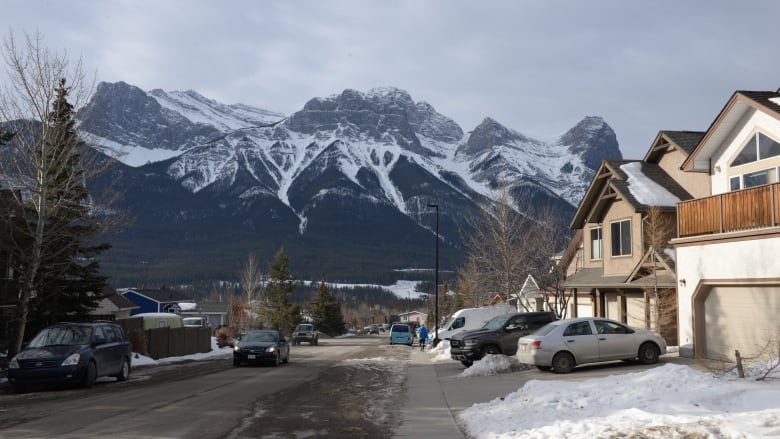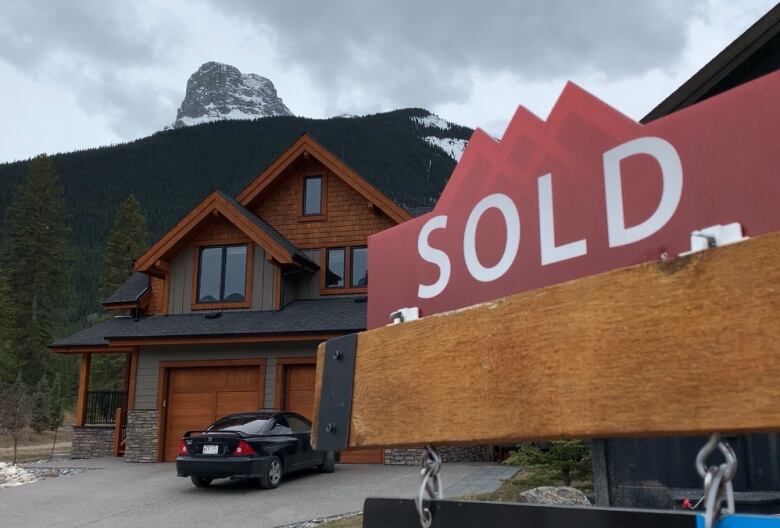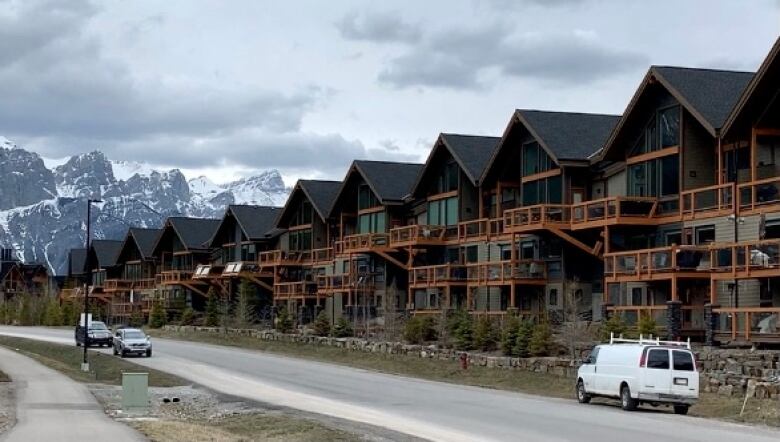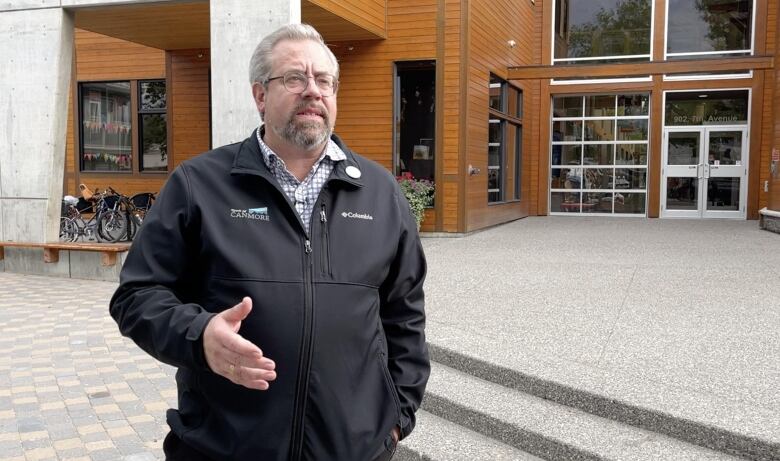Canmore residents long for more permanent neighbours as 'weekenders' snap up homes
26% of property in the mountain town is not occupied by permanent residents, according to last census

When Karsten Heuer walks through his neighbourhood days after a snowfall, or at night on a weekday, it's easy to see who isn't around.
Some residences stay dark, and untouched, except for weekends and holidays.
Locals call them "weekenders" and the population is hard to trackbut, according to the 2021 federal census,26 per cent of property owners in Canmore, Alta., don't live there full time.
But with the housing market's ups and downs throughout the pandemic, it isn't clear how many of these part-time residents the mountain community currently has.
One thing some residents worry about is that, without legislation or action from the municipality, Canmore is in danger of hollowing out losing a sense of community and the ability to sustain local services.
"There's repercussions in finding enough people to run your fire department, for instance," said Heuer, who is the president of a local group called BowValley Engage.
"I've lost count of how many young families, working families, good friends, that have had to leave because they just have had to go somewhere else where it's actually affordable to live."
About half of realtor Robb Aishford's clients are looking for a second home in Canmore. He said back in 2020, when pandemic health restrictions kicked inand people began working from home, the Bow Valleyhousing market blew up.
"They want either an escape for the short term or something long term for retirement. But they love the opportunities here," Re/Max Alpine Realty's Aishford said.
"There was definitely strong demand. There were multiple offers, on properties. Showings were quick. Things will often hit the market and sometimes that afternoon they'd be gone."

The dust has since settled.
The Bank of Canada's decision to raise its benchmark interest rate to 4.5 per cent the eighth increase in less than a year has seenmortgage costsescalateand market conditions shift. The market in Canmore is still steady, but not as frantic.
The way Aishford sees it, people seeking secondary homesin Canmore aren't competing with locals. With the highprice of an average single-family home, he said, locals, tend to gravitate toward a more affordable price-point, condos and town homes.
As the market sits now, you can pay between $500,000 and more for a condo or multi-family unit in the town. The next step up, a single-family home,starts at about $1 million.
"You're not competing with the locals unless they are moving up in the market," Aishford said.
While some of his clients look for a place for holidays, others simply have a retirement investment plan in mind. There are properties in the town zoned for Airbnb-style usesthat the owner can move into later in life if they choose.

For first-time buyers, the Bow Valley has always been a tough market.
Clients who come to mortgage broker Shannon Hendrikse at Canmore Mortgage House start their searches in the mountain town, but 15 to 20 per cent realize pretty quickly that their dollar can stretch further in Cochrane or Calgary and expand their search.
That's a common story for first-time home buyers, Hendrikse said. But it's also a trend she's seen for those who already have some equity built up.
"They might have bought maybe a small condo, but now they've been in there a little while, they've built up a little bit of equity," Hendrikse said. "But with the higher rates that we're seeing now and everything it's still making it quite challenging for them to actually afford to get into that next price point."
Some, she said, stay put in that case, but others expand the search to look at a property outside of Canmore.
Remote workers eyeing Canmore
Hendrikse said she's also seen a new market emergewith the dawn of remote working.Buyers in Ontario or British Columbia looking to relocate have looked past Calgary and taken an interest in Canmore, she said.
"It seems to be a continuing trend, not really seeing that part of it settle down, if anything almost increasing, especially as ... the markets in Ontario and BC have been cooling a lot more than they are now," Hendrikse said. "A lot of people are looking at Alberta as a really solid investment."

"If you just let market forces shape everything, you're not gonna have a community that actually works," Heuer said. "You're just gonna have a group of high-end cottages and nobody to maintain her or run your community."
He fears without intervention, the town's workforce will turn to commuting instead of residing in Canmore.
He feels the streets of his neighbourhood, near the Bow River, have shifted from full-time residents to weekenders. A home under construction, he points out, used to house a nurse and a waste management worker. Across the street, two lots are occupied by a single large home.Aholiday wreath still hangson the door.
"These people who have second homes I know some of them, they're great people, right?" Heuer said. "It's not a conscious thing that they're trying to change the community in these deleterious ways, but it's happening."
Council's top issue is housing, mayor says
Leadership, Heuer said, is what Canmore needs to turn this trend around.
Affordability and housing come up a lot at the town's council meetings. It's anage-old issue that's always top of mind, but one with no "silver bullet" solution, according to Mayor Sean Krausert.
"We are in a housing crisis," Krausert said. "Whereas some jurisdictions have different tools at their disposal, in Alberta, we have very few tools that would allow us to deal with the issue."
One tool Canmore wants to explore is creating incentives for homeowners to live in Canmore full-time.
Cities like Toronto, Ottawa, and Vancouver have what's called a vacant home tax with the requirement to sign an annual declaration of occupancy status. If the home isn't a principal residence and sitting empty, these municipalities have different ways of increasing the cost on the property owner. The goal of such a policy would be to incentivize owners to either rent out the second residence, live in it,or face the cost.
Whether such rules could be replicated inAlberta is unclear, Krausert said, adding the town is investigating its options.
Canmore has long-controlled vacation rentals, which can only operate in the town's centre, require a permitand are banned in most residential areas. In 2022, the town had 607 on the books.
Krausert said the town is considering tighteningthebylaw thathelps restrict the use of these short-term rentals.
He said the way the town's bylaws were written, a long-term rental contract isclassified as anything greater than 28 days.But some property owners are letting people rent short term, under the guise of a long-term lease, in residential neighbourhoods. Krausert feels that signing those types of leases is a disingenuous way around the spirit of the bylaw.
"I believe that's wrong and we're going to have to address that," he said.
Rules around vacation rentals, or short-stay homes and taxing second-home owners can only go so far in easing the housing crisis, Krausert said.For the mayor, the bottom line is a need to invest in affordable housing, which is easier said than done.
"You can't flip a switch and have a solution ...but we're actively working on several fronts," he said.












_(720p).jpg)


 OFFICIAL HD MUSIC VIDEO.jpg)
.jpg)



























































































